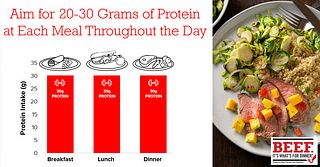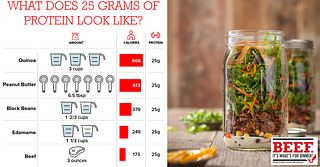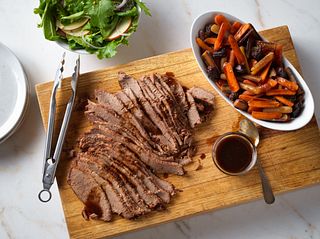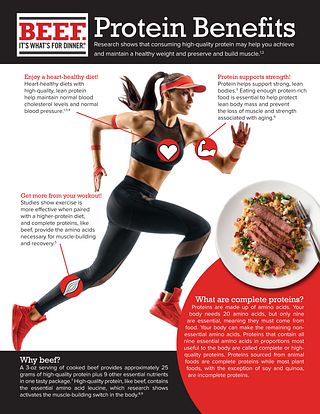The Power of Beef's Protein

If there was a protein contest, beef would surely be crowned the king! Among the powerful package of 10 essential nutrients beef is known for, protein may be one of the most notable. In fact, one 3 oz. cooked serving of beef provides 50% of your Daily Value (25 grams) for this important nutrient - making it an excellent source!
Protein Benefits
A wealth of research1 has linked protein to favorable lifestyle markers such as healthy body weight and/or weight loss, maintaining and building muscle, and overall diet satisfaction. When you’re looking for ways to improve your health, manage your weight or satisfy your appetite, consider all that protein can do for you:
- Feeling hungry? People who eat a higher-protein diet (about 30% of daily calories from protein) feel more satisfied, which may help prevent overeating.2
- Protein helps support strong, lean bodies. Eating at least 4 ounces of high-quality protein from foods like beef at each meal provides your body with energy to lead an active lifestyle.3
- Protein may help cut the fat. Research has shown exercise is more effective for weight management when paired with a higher-protein diet, and beef provides the amino acids necessary for building and replenishing muscles.4
Protein Throughout the Day

It's not only important to just get protein in at dinner or lunch, but to spread it throughout your day. This can really maximize the benefits. Aim for 25-30 grams of protein at each meal and you'll start to feel a difference.

Westerterp-Plantenga MS, et al. Dietary protein, metabolism, and body-weight regulation: dose–response effects. Int J Obes 2006;30:S16-S 23.
Paddon-Jones D, et al. Protein, weight management, and satiety. Am J Clin Nutr 2008;87:1558S-61S.
Paddon-Jones D, et al. Role of dietary protein in the sarcopenia of aging. Am J Clin Nutr 2008;87:1562S-6S.
Wolfe, RR. The underappreciated role of muscle in health and disease. Am J Clin Nutr 2006;84:475-82.
Devkota S, Layman D. Protein metabolic roles in treatment of obesity. Curr Opin Clin Nutr Metab Care 2010;13:403-7.
Leidy HJ, et al. Beneficial effects of a higher-protein breakfast on the appetitive, hormonal, and neural signals controlling energy intake regulation in overweight/obese, "breakfast-skipping," late-adolescent girls. Am J Clin Nutr 2013;97:677-88.
Westerterp-Plantenga MS, Luscombe-Marsh N, Lejeune MPGM, Diepvens K, Nieuwenhuizen A, Engelen MPKJ, Deutz NEP, Azzout-Marniche D, Tome D, Westerterp KR. Dietary protein, metabolism, and body-weight regulation: dose–response effects.• Leidy HJ, Bossingham MJ, Mattes RD, Campbell WW. Increased dietary protein intake consumed at breakfast leads to an initial and sustained feeling of fullness during energy restriction compared to other meal times. Br J Nutr. 2009;101:798-803.
U.S. Department of Agriculture, Agricultural Research Service. 2015. USDA National Nutrient Database for Standard Reference, Release 28. Available at: http://www.ars.usda.gov/ba/bhnrc/ndl.
Layman DK, et al. Dietary protein and exercise have additive effects on body composition during weight loss in adult women. J Nutr 2005;135:1903-10. Mamerow MM, Mettler JA, English KL, Casperson SL, Arentson-Lantz E, Sheffield-Moore M, Layman DK, Paddon-Jones D. Dietary Protein Distribution Positively Influences 24-h Muscle Protein Synthesis in Healthy Adults. J Nutr. 2014 Jan 29




Share This Page